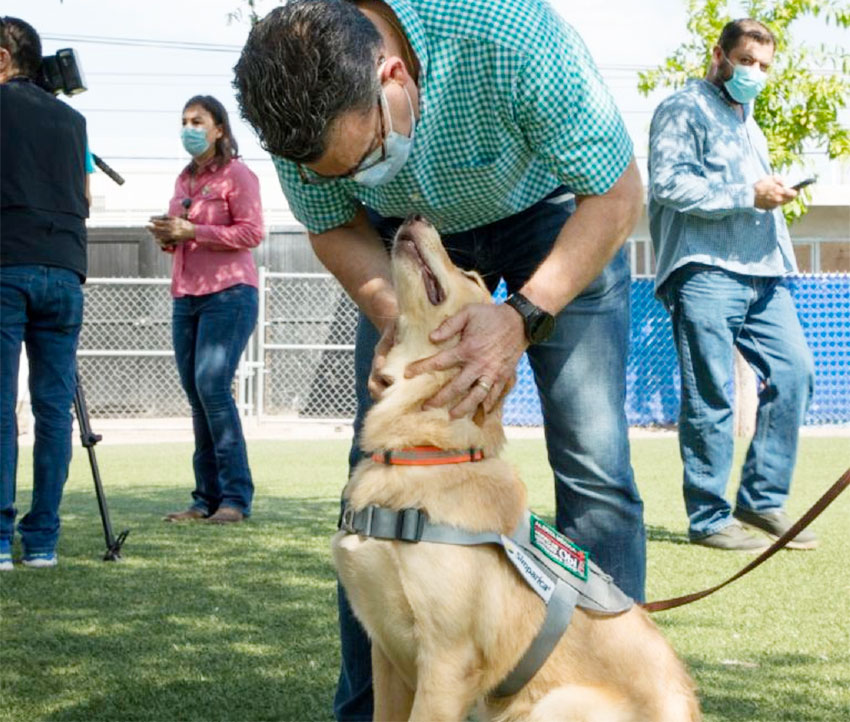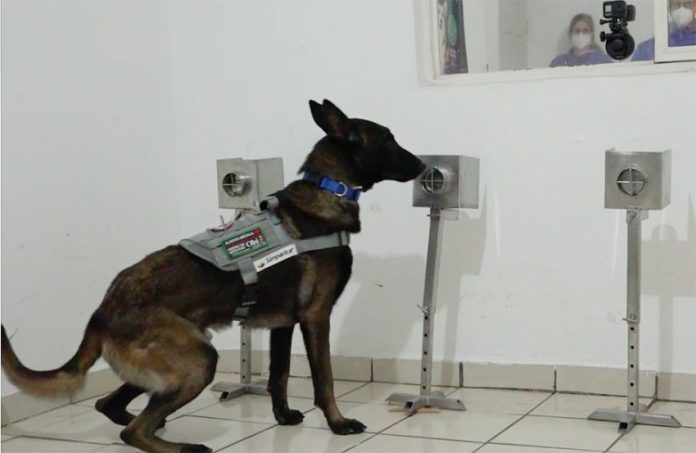The owner of a canine training center in Hermosillo, Sonora, is undertaking a new project born out of the current times: he’s training dogs to detect the coronavirus.
While his business was closed for four months by the coronavirus pandemic, Sergio Castilla became interested in efforts in other parts of the world to train dogs to detect Covid-19 and decided he would attempt to do the same in the Sonora capital.
The first person he told about his idea was Juan Manuel Mancilla Tapia, an epilepsy sufferer with whom he had worked to train Leia, a golden retriever, as a seizure alert dog.
Castilla also recruited his friend Victoria Lozano and together the three dog lovers began OBI Caninos Contra el Covid (OBI Dogs Against Covid), the first project in Mexico to train dogs to sniff out the coronavirus.
The name of the project comes from Mancilla’s former seizure alert dog, Obi, who died at the start of the year.
Five dogs are currently in their third and final stage of training: Leia, the golden retriever already trained as a seizure alert dog; Sam, a Belgian shepherd; and Mike, Ringa and Harry, three German shepherds.
Castilla told the newspaper Milenio that the dogs are learning to detect people with the coronavirus by learning to recognize the smell of the virus’s volatile organic compounds, which can be found in an infected person’s sweat, saliva and urine even before they develop symptoms.
He explained that the first stage of training involves introducing a toy to a dog and allowing the animal to play with it so that over time he develops a fondness for and attachment to it. Once that is achieved, a part of the toy is cut off and placed in a receptacle along with a sample of sweat collected from a person who has tested positive for Covid-19 at a state-run laboratory in Sonora, Castilla said.
The dog is allowed to smell the sample along with the toy part and as a result associates the latter with the former. Then the formal training process begins.
“It’s a matter of saying to the dog, ‘Do you want your toy? Look for the smell,’” Castilla said, adding that the dog subsequently becomes addicted to the odor “because he wants to play.”
Once a dog has learned to differentiate between the smell of the toy part and the smell of the sweat sample, the former is removed from the receptacle, he said. When a dog subsequently locates the sweat sample on its own, he is rewarded with his toy, Castilla said.

He stressed that the dogs are not directly exposed to the sweat samples and are not placed at any risk, even though there is no evidence that they can contract the coronavirus.
The final part of the training process involves setting up several receptacles that contain human sweat samples. However, only one of them has a sample from a Covid-positive person. Once a dog can immediately locate the Covid-positive sample among the various sweat samples, he or she is considered to be successfully trained.
Castilla said that in the real world, a trained dog will alert its master to a case of Covid-19 through his behavior.
“If you have a virus, … the dog will change his behavior, he’ll feel a little bit worried and tense because he doesn’t know how to explain to you that there is something inside you that’s giving you a different smell,” he said.
Castilla said that during the three-month-long training process, he and his colleagues have received guidance and assistance from researchers at Durham University in England and Dr. Anna Hielm-Björkman, a professor of equine and small animal medicine at the University of Helsinki who is monitoring a canine Covid-detection trial at the airport in the Finnish capital.
“All these experts … have been studying how dogs can detect Covid-19 and other diseases such as cancer,” he said. “Some of them are already operating [Covid-19 detection] programs in airports.”
Castilla said that his first group of canine Covid sleuths could be deployed to the international airport in Hermosillo in as soon as two weeks. That would make them the first Covid-19 detection dogs to work at an airport in Latin America, he said.
Castilla added that he plans to train a new group of six furry recruits that could be put to work at hospitals and entry points to Sonora, where they could do their bit to help prevent the spread of coronavirus in the state.
Mancilla, the epilepsy sufferer and owner of budding Covid detection dog Leia, told Milenio that he and his colleagues would one day like to open a canine institute where perceptive pups will undertake training to sniff out a range of different diseases.
Source: Milenio (sp)
